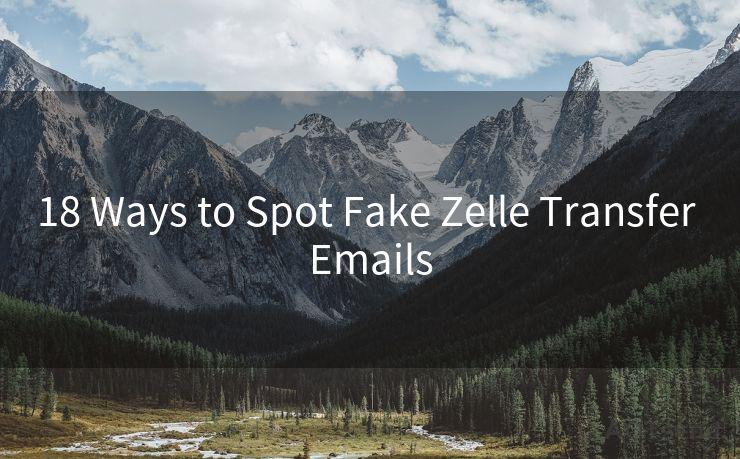18 Ways to Spot Fake Zelle Transfer Emails




In the digital age, fraudsters are constantly finding new ways to deceive unsuspecting individuals. One common scam involves fake Zelle transfer emails that aim to steal personal information or money. To help you stay vigilant, here are 18 ways to spot these fraudulent emails.
1. Suspicious Sender Addresses
Always check the email address of the sender. Fake emails often use addresses that look similar to official Zelle or bank email addresses but with slight variations. Be suspicious of any address that isn't an exact match.
2. Generic Greetings
If the email starts with a generic greeting like "Dear User" or "Dear Customer" instead of your actual name, it's likely a scam.

3. Urgent Tone
Scammers often use urgent language to pressure you into action. Be wary of emails that demand immediate attention or threaten consequences if you don't respond promptly.
4. Grammar and Spelling Errors
Official communications from Zelle or your bank will be professionally written and proofread. Typos and grammatical errors are red flags indicating a fake email.
5. Suspicious Links
Hover over any links in the email to check the URL before clicking. Fraudulent emails often contain links that lead to phishing websites designed to steal your information.
6. Requests for Sensitive Information
Zelle and your bank will never ask for sensitive information like passwords or PINs via email. Any such request is a sure sign of a scam.
7. Unusual Attachments
Be cautious of attachments in unsolicited emails, as they may contain malware. Never open attachments from unknown or suspicious sources.
8. Threatening Language
Emails that threaten to close your account or take legal action if you don't respond are typically scams. Zelle and banks do not use such aggressive tactics.
9. Fake Logos and Branding
Compare the logos and branding in the email to the official ones. Scammers often use slightly altered versions to fool recipients.
10. Unsolicited Requests for Money
Never send money to anyone who contacts you unexpectedly, even if they claim to be from Zelle or your bank.
11. Check the Email Footer
Official emails often have a footer with contact information, legal disclosures, or links to the company's privacy policy. Fake emails may omit these details.
12. Verify the Information
🔔🔔🔔
【AOTsend Email API】:AOTsend is a Managed Email Service for sending transactional emails. Support Email Types: reminders, authentication, confirmations, notifications, verification codes, invoices, password resets, account activations, billing statements, two-factor authentication (2FA), and one-time passwords (OTP) emails, etc. $0.28 per 1000 Emails. 99% Delivery, 98% Inbox Rate.
You might be interested in:
Why did we start the AOTsend project, Brand Story?
What is a Managed Email API, How it Works?
Best 25+ Email Marketing Platforms (Authority,Keywords&Traffic Comparison)
Best 24+ Email Marketing Service (Price, Pros&Cons Comparison)
Email APIs vs SMTP: How they Works, Any Difference?
If you receive an email claiming to be from Zelle, contact Zelle's customer service directly to verify the information.
13. Be Wary of Too Good to Be True Offers
Scammers often use enticing offers to lure victims. Be skeptical of any email promising large sums of money or unbelievable deals.
14. Use Anti-Spam and Anti-Virus Software
These tools can help filter out suspicious emails and protect your device from malicious attachments.
15. Unexpected Changes to Your Account
Be cautious of emails claiming unexpected changes to your Zelle account, such as sudden large transfers or unauthorized transactions. Always verify these claims directly with Zelle or your bank.
16. Phishing Attempts
Be aware of phishing attempts that try to trick you into revealing sensitive information. Zelle will never ask for your password or PIN via email.
17. Unsubscribe Option
Official marketing emails often include an unsubscribe option. The absence of such an option may indicate a fraudulent email.
18. Trust Your Instincts
If an email feels off or suspicious, trust your instincts and don't click any links or download any attachments. Instead, contact Zelle or your bank directly for clarification.
By following these 18 tips, you can protect yourself from falling victim to fake Zelle transfer emails. Remember, always err on the side of caution when dealing with unsolicited emails, and never hesitate to contact the official source to verify any suspicious claims. Stay vigilant, and you'll be able to avoid these common scams.




Scan the QR code to access on your mobile device.
Copyright notice: This article is published by AotSend. Reproduction requires attribution.
Article Link:https://www.mailwot.com/p4401.html



